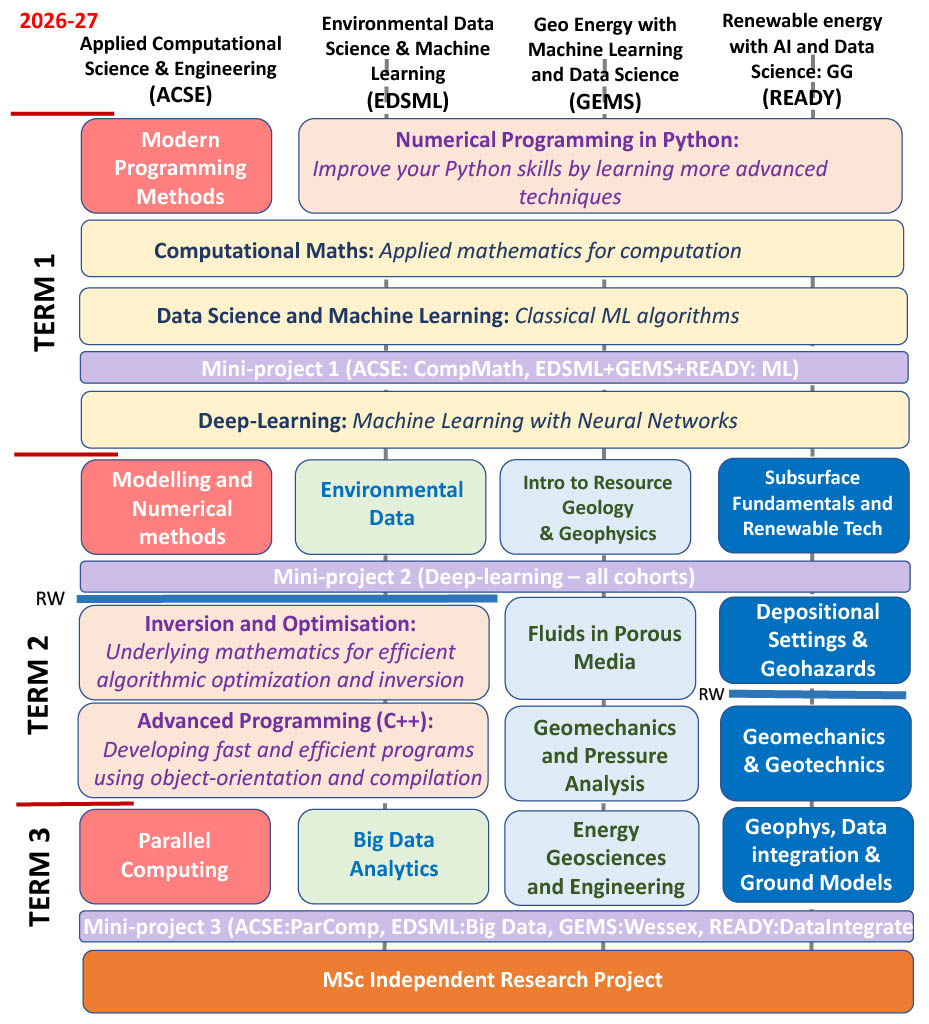Key Information
We strive to increase and broaden inclusivity and support everyone, regardless of background, in breaking down any barriers to your application the Department.
If you are unable to pay a course’s application fee, we encourage you to apply for a fee waiver. If you are interested in this MSc and wish to apply for a fee waiver, please contact adalovelace-admissions@imperial.ac.uk prior to starting your application.
For the future of environmental sciences
 Join this multidisciplinary 1 year MSc programme to train in fundamental computational and data science skills and shape your understanding of environmental science.
Join this multidisciplinary 1 year MSc programme to train in fundamental computational and data science skills and shape your understanding of environmental science.
The MSc Environmental Data Science and Machine Learning at Imperial College London will train students in fundamental computational and data science skills for application across the environmental sciences. The course is led by expert computational scientists in the Department of Earth Science and Engineering. The programme offers a focus on environmental big data in addition to established modules in machine learning, computational science and modern programming skills that run in the Applied Computational Science and Engineering MSc.
Find the most recent MSc Environmental Data Science and Machine Learning Programme Specification on the Imperial College London course page for the MSc Environmental Data Science and Machine Learning.
Who is the course for?
If you:
- have a first degree in an Engineering or Science-based subject and would like to expand your knowledge of Environmental Data Science, or
- would like training in Data Science and Machine Learning with a strong applied focus, or
- have a background in Environmental Science and want to develop computational/data science and coding skills,
then you will benefit from joining the MSc Environmental Data Science and Machine Learning.
Applicants are expected to have some experience with programming in a high-level language and a background in University-level mathematics. Please refer to these frequently asked questions for further information regarding prerequisite knowledge.
Why should I apply?
Are you interested in learning data science and machine learning skills and to apply them to environmental science topics including the low carbon energy transition, sustainability, future cities, water & air quality?
This programme will:
- Educate future environmental scientists in the field of data science, machine learning, remote sensing, environmental monitoring, scientific programming and computational methods applied to environmental science and engineering.
- Allow students to generate, manipulate, interrogate, analyse, visualise, interpret, invert and learn from data to explore a range of problems using a variety of techniques.
- Teach underlying theory as well as the implementation of methods in high-quality code.
- Expose students to a wide range of data science and machine learning applications.
Course Information
The study programme consists of eight taught modules, and one individual research project which accounts for one third of the study programme.
Term 1
Modern programming methods and Cloud Computing
Computational Mathematics
Environmental Data
Term 2
Applying Computational/Data Science (several short group projects)
Advanced programming
Big Data Analytics
Inversion and Optimisation
Term 3 (summer)
Machine Learning
Independent Research Project.
Some representative research project titles include:
- Deep Learning applied to the interpretation of subsurface data
- A GNSS Satellite Selection Scheme based on Line-of-Sight and Satellite Geometry with a Machine Learning Approach
- A Machine Learning Approach to the Prediction of Tidal elevation
- Applying Novel Data-Driven Techniques to Wind Turbine Predictive Maintenance
- ARGO Trainer: Developing of a new software platform to annotate, visualize and analyze ARGO float data.
- Assessing the environmental sentiments of the public using Twitter data
- Automated crater detection based on the YOLOv3 architecture and its application to CTX imagery
- Machine learning based bathymetry derivation from high-resolution satellite imagery
- Machine Learning for Automatic Facies Classification from 3D Geophysical Models
- Mapping coastal wetlands with Google Earth Engine and Machine Learning
- Multi-scale tsunami inundation and sea defence modelling
- Optimal Drone Recharging Scheduling for Wireless Sensor Power Transfer and Data Collection
- The assessment and optimisation of CO2 storage in the UK for climate change mitigation
- Machine Learning-based Classification of Europa’s Fractures
Students will have the chance to participate in individual and group research projects as well as to write reports and present technical work, developing the project management and numerical skills that are desired by employers.
You can see the teaching schedule represented visually below. If you would like an accessible version of this information, please contact ESE webmaster.

Graduates of this course will be well placed to fill the significant market demand for those with applied, hands-on computational and data science experience.
Many of the skills you learn are applicable broadly across all of science and engineering and so potential career paths are hugely diverse. The additional knowledge of environmental science and associated engineering solutions you will be exposed to in this course will make you particularly attractive to anything from relatively small environmental and engineering consultancies to large multi-national organisations including those in the energy and big tech sectors.
The skills gained on this course are also important in research and will be of value for jobs in R&D or future PhD studies. See for example previous skills gaps reviews in the Environment Sector.
This immersive, hands-on MSc course will enable students to develop their skills and techniques for a range of Environmental science and engineering applications utilising Cloud and High Performance Computing resources. Students will learn alongside world-class researchers in the Department of Earth Science and Engineering. There will be a strong emphasis on high productivity problem solving using modern computational and data science techniques.
Applicants who want to pursue highly numerate and computational based careers in environmental science and engineering, including climate, renewable energies, sustainability and earth imaging, are a target for this course. Graduates will develop the skills necessary to enter the modern industrial workforce. This MSc will also prepare for your PhD studies in fields such as computational and data science techniques, simulation, numerical modelling, optimisation and inversion, and machine learning applications.
The Environmental Data Science and Machine Learning MSc programme will ensure that students are able to apply appropriate computational techniques to understand, define and develop solutions to a range of environmental science and engineering problems. You will have the chance to participate in individual and group research projects as well as to write reports and present technical work, developing the project management and numerical skills desired by employers.